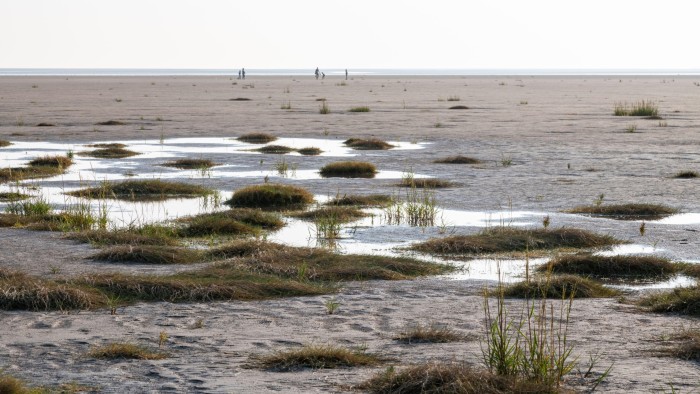Unlock the Editor’s Digest for free
Roula Khalaf, Editor of the FT, selects her favourite stories in this weekly newsletter.
Andrew Michael Hurley has built his reputation on novels where the landscape itself seems alive: The Loney’s treacherous sands (2014), Devil’s Day’s uncanny valleys (2017), the grief-haunted fields of Starve Acre (2019). His new book, Saltwash, pushes this further still, conjuring a desolate seaside town on the Lancashire coast as both stage and character, a place where the human and the elemental collapse into one another.
Tom Shift arrives in Saltwash with a shadow hanging over him: a terminal diagnosis, the end already inscribed in his body. A former journalist, divorced, childless, Tom narrates his dwindling life in a scrupulous, slightly antique register — words like “chary,” “commodious,” “senescence” — a diction that feels half-spectral.
It seems to reflect the town itself, out of time, haunted by its past. “English dilapidation was different. It was blistered Formica on the tables of a seafront café. Derelict gift shops and thrift shops with whitewashed windows. A pub with steel plates over its doors. Cracked, pebble-dashed shelters along the promenade, roosted by gulls.” Saltwash, with its driving rain and its vast tidal flats, is the literal and metaphorical end of the line.

Tom has come to Saltwash to meet Oliver Keele, a fellow cancer patient with whom he has struck up a pen-friendship. Oliver has promised him dinner at the Castle Hotel, which he describes in palatial terms. But the hotel, when Tom arrives, is another husk — once grand, now shabby and desperate. Tom is given a mysterious red badge to wear and then sits at the bar; one by one, groups of elderly people drift in, dressed as if for a gala. Only gradually does it become clear that this is no reunion but a ritual: a fellowship of the desperate, who meet each year to pursue a terrible prize.
Hurley is expert at withholding, at allowing the world to tilt degree by degree until the floor gives way. To reveal the precise terms of the ritual would be to rob the reader of that pleasure. What can be said is that the revelations land with such devastating force not because they are fantastical but because they feel inevitable.
Every member of the dinner carries an intolerable freight of memory, of misdeed or regret. Tom himself recalls abuse at the hands of a “fellow who’d worked nights in an abattoir and always had blood under his fingernails”. Hurley’s most chilling insight is that longevity itself becomes a curse: live long enough, and you are crushed beneath the weight of your failures.
Hurley finds horror in the attrition of time and the shabby cruelty of England in decline. At moments, the novel shades into the grotesquerie of the British comedy-horror TV show The League of Gentlemen: the sense that the ridiculous and the horrifying are never far apart. Then, in the book’s final pages, the register shifts sharply, towards a kind of acceptance, the recognition that, in the end, “Everyone was just tangled up in the strange and arbitrary happenings of the world. Everyone was simply dazed by the accident of being alive.”
Saltwash is a vision of England at the end of its tether: rain-lashed, its institutions rotted, its people hollowed by memory. This is folk horror for our moment, where the terror is not that the old gods might return, but that they have been living and working darkly within us all along.
Saltwash by Andrew Michael Hurley John Murray £16.99, 256 pages
Join our online book group on Facebook at FT Books Café and follow FT Weekend on Instagram, Bluesky and X

